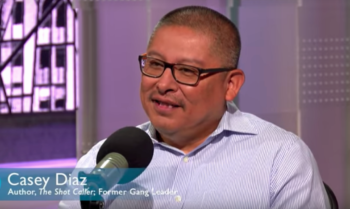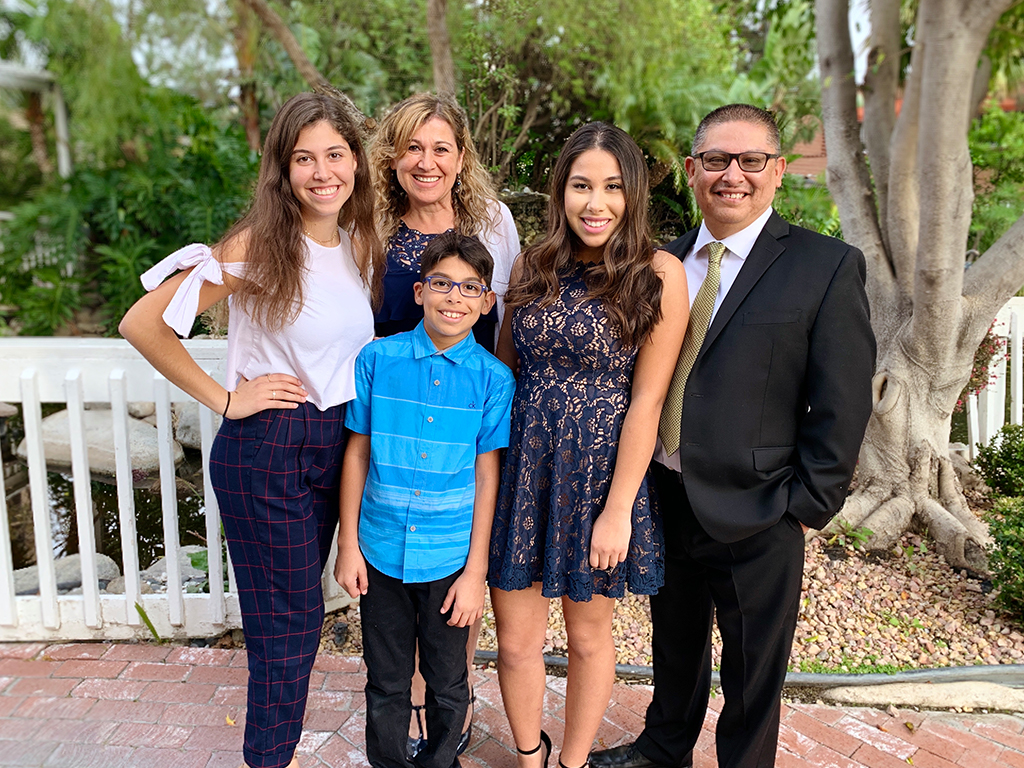By Mark Ellis –

At two years old, he arrived in L.A. from El Salvador as a legal immigrant. His mother worked long hours as a seamstress and his father sold marijuana.
“I was introduced to the gang culture at 11 years old,” says Casey Diaz, author of The Shot Caller, in an appearance on The Eric Metaxas Show.
As gangs moved into his neighborhood in the Rampart District, a friend introduced him to a gang member. “He gave me a brief description of what a gang was and it lured me in. It became a false sense of family that I didn’t have at home,” he told Metaxas.
A popular gang leader took young Diaz under wing. “He took a liking to me; he took me with him to steal a car.”
One night everything changed for Diaz. He went with the gang as they searched for a rival gang member. “We found him, assaulted him, and ended up stabbing the guy.”
Tragically, the gang leader handed Diaz a screwdriver and said, “Now it’s your turn.” It was the first of many stabbings to come.
Unfortunately, he had already experienced violence in his own home. “My father was extremely violent,” he recounted. “He beat my mom. There was not one week that my mom was not beaten senselessly and left in a pool of blood at the hands of my father.”
The popularity of the gang leader transferred to Diaz by association. “People patted me on the back and validated me. If you don’t have validation from your father, a gang leader or drug leader will do that in the streets,” he said.
Violence became routine, even normal. “A craving started within me,” he recalled. “I wanted to go out there. I needed to go out there. I went out there and sought other gang rivals and did whatever I needed to do.”
Arrest and trial
At 16 he was arrested for a gang-related murder. They held an evaluation to determine if Diaz should be tried as a juvenile or adult and whether rehabilitation was possible. During the 90-day evaluation he strangled a rival gang member and almost killed him, so he was sent to a special gang module at L.A. County Men’s Jail housing everyone wanted for murder.
While there, he earned the title, “The Shot Caller.” It refers to a gang leader who has the authority to put a name on a piece of paper and pass it to others who will carry out his instruction to have someone killed.
At the conclusion of his trial he was sentenced to 12 years in solitary confinement and ended up at New Folsom State Prison.
One day he was surprised to hear a woman’s voice outside his cell. “Is there an inmate in that cell?” a diminutive African American woman named Frances Proctor asked the guard.
“Don’t waste your time,” the guard replied gruffly.
“Jesus came for everyone, including him,” she retorted. “Can I approach his cell?
Proctor approached his gate and saw Diaz. “How are you doing?” she asked.
“I couldn’t be doing better,” he said sarcastically.
Frances laughed and then began “her little presentation.”
Diaz told her he wasn’t interested. “I wanted nothing to do with her or her religion. I never went to church. I had no biblical knowledge, didn’t care about God, wasn’t looking for God.”
“Well, I’m going to put you on my prayer hit list and Jesus is going to use you,” she told him boldly.
This lady is nuts, Diaz thought. She has no clue about what she’s doing here or who she’s talking to.
For the next 18 months Proctor interceded for Diaz. Once a month she stopped by his cell and spent a few short minutes praying for him.
The cell Diaz occupied in solitary confinement was eight by 10 feet, with a toilet standing on a concrete slab, a two-inch thick mattress on a bunk for sleeping, a tee-shirt, white boxers, and a roll of toilet paper. There was no window.
“There was nothing you can hang yourself with in that cell. You weren’t allowed to have books in there,” he said.
Over time, some men some men lost their minds due to the isolation. “We heard about men that started talking to themselves and some would want to end their life. They would run from one end of the cell and hit the metal gate head first, in hopes of cracking their head or neck. We heard a lot of that.”
His gang leader ordered Diaz to kill whomever he came into contact with, whether a guard or an inmate of a different race. “Those were our orders. It is gang rules and prison politics. You have to abide by them or you end up getting killed yourself.”
A video from God
One day Diaz had an astonishing experience in his cell.
“I was laying on my bunk looking at the concrete wall. I started to see what looks like a film on my wall. I was awake, not under the influence of any kind of drug. This film was showing me my life being played back, from when I was small, the first candy I stole at a 7-eleven.”
All the events in his life were in perfect order, but something unexpected was interspersed throughout the video.
“It would stop and I would see a guy carrying a cross and there were crowds around him.”
Because Diaz had no church background of any kind, he had no idea what this might be. “I knew that whoever was carrying this cross nobody liked him. The guy carrying the cross kept looking at me. I couldn’t see his face, but I knew he was looking at me.
“Nobody had ever explained the Bible to me. I had never picked up a Bible or went to church. I knew zero of Christianity.”
In the video of his life he saw people he stabbed, carjackings he participated in, and home invasions he executed. “I did all of that and it was all in order.”
Then he witnessed something tragic happen to the man with the cross. “I saw the nails coming into his hands and his feet and the cross being raised.”
The man on the cross looked at him and said, “Darwin, I did this for you.” Hardly anyone knew that Darwin was the first name on his birth certificate. Casey was a nickname he acquired and used his entire life.
Then Diaz watched the man’s face drop as he audibly released his last breath.
“That’s when I got down in my cell and started to ask for forgiveness,” Diaz recounted. “Nobody ever told me how to pray. I knew in my spirit. I knew in my spirit this is what I needed to do.”
In the middle of the cement floor Diaz began to weep uncontrollably.
A spirit of repentance fell on him. “I’m sorry for stabbing this guy and stabbing that guy, and ordering the stabbing of this guy,” he sobbed.
“I never wept like that,” he said.
In that moment God sovereignly made him alive in Christ. He was born again. “I knew in my heart something had changed. It was a light that came on and I needed to do whatever I needed to do. I had never felt so at peace and so free in solitary confinement.”
Shortly after that God spoke to him audibly: “Go knock on your gate and ask for the chaplain.”
Diaz had no idea what a chaplain was, so he went over to his gate and knocked.
At that moment a guard appeared two cells away walking toward him.
“I’m supposed to ask you for a chaplain.”
The guard looked at Diaz with a puzzled expression. “Are you pulling some _________?”
“I’m supposed to ask you for a chaplain,” he insisted, not even knowing what the term meant.
Later that week Diaz sat down with a prison chaplain. “They had me in restraints and I explained to him in detail exactly what happened in that cell,” he recounted.
The chaplain was visibly moved and tears formed in his eyes. “His bottom lip started to shake and he opened his Bible. He started to read about the crucifixion and Him (Jesus) walking to Golgotha. When he started to read that we both broke. A lot of tears were shed in that moment because I knew that’s what I had seen. No one had ever told me about that.”
The chaplain gave Diaz a Gideon Bible and the gang leader began to devour it. “If I was awake I would read it and read it and read it.
“I started in Genesis and by the time I got to Acts I could see that these guys were ordinary men that God used. Not everyone was clean in this Bible. These are guys that have done horrendous things and God has forgiven them.”
Then God’s voice spoke to him audibly again: “When you get out of here, you are going to gather your homeboys, your gang leaders and you’re going to let them know you want nothing to do with this anymore, that you are now a Christian.”
Not long after this, Diaz received another surprise: he would be moved from solitary confinement to the regular prison population. “To this day I don’t know why,” he said. “I know it was ordained by God.”
As soon as Diaz had the opportunity, he went out to the prison yard and stood up on a concrete bench. He told several gang leaders to hear him out.
He explained what happened. “I don’t want any part of this anymore,” he told them. “I’m a Christian.”
There were no further words exchanged. The gang leaders simply turned around and walked away quietly.
Diaz knew what that meant. A hit was placed on his life from that moment on.
“When somebody turns, they send somebody to take out the trash,” he explained. “I’m the trash at this point.
He spent a long night in prayer to God, knowing his executioner might be coming as early as the next day. In the morning he sat on his bunk with his Bible close to his side.
Soon the gates opened at once so the men could go to chow hall for breakfast.
“They sent one of my very own to do the deed,” he recalled. One of his gang members came in with a shank, a makeshift knife.
Diaz was prepared for the worst, but then the man surprised him by saying: “I hope you’re right because I can’t do this.”
Unexpectedly, the man had a sudden change of heart. The killer sent to take his life became the first person Diaz led to the Lord.
“Little by little I began to witness to other gang members in there, using ‘kites,’ handwritten notes that we used to pass around. Shortly after that, one of the founding members of MS-13 came to Christ through one of those kites, then another gang leader from South Central.”
During the next two years, he helped lead 200 inmates to Christ.
At the same time, he had regular attempts on his life. “We would get jumped. We would be walking somewhere in the yard, or on the way to chow, and all of a sudden there is 20 to 40 inmates on top of you, beating you. Or, they would walk into your cell and do that. It happened to me a countless amount of time during those two years.”
One day he told God: “I gave it all up for you and this is what I get?”
The Lord spoke to his heart: You didn’t give up anything for me. I gave it all up for you.
If you want to know more about a personal relationship with God, go here
To learn more about Diaz’s book, click here




